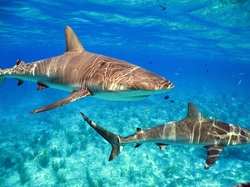 You have probably heard that a shark must swim in order to breathe or it will die. This does hold true for some sharks, but with over 500 described species, there are bound to be some exceptions (and in this case, there are lots!) As you may know, sharks are a group of cartilaginous fish. They live across all the oceans of the world from pole to pole. Because they are fish, sharks get their intake of oxygen from the water they inhabit. This is accomplished via a specialized respiratory apparatus of gills. Most sharks have five pairs of gills made up of cartilaginous gill arches that support a vast network of gill filaments. These filaments are highly vascularised, meaning they contain numerous thin blood vessels and provides a large surface area for gas exchange. This also explains the bright red coloration found in shark (and fish) gills. In order to exchange carbon dioxide for oxygen, sharks must continually pass water over these gill filaments. The oxygen in the water is taken up by the red blood cells, while carbon dioxide is released into the water, similar to the process of respiration in our lungs. The amount of oxygen a shark requires is directly dependent on the way it lives. Deep water and sedentary sharks like the Greenland shark have very low oxygen requirements; fast moving, highly active sharks like the mako have requirements that are on par with warm-blooded mammals. These highly active sharks take advantage of their forward momentum to passively force water through their mouths and over their gills in a process called ‘ram-ventilation’. Unlike most fish, these very active sharks lack the physical apparatus to manually pump water over their gills and are obliged to swim continuously in order to pass enough water over their gills to meet oxygen demand. Unfortunately, this condemns them to certain death if they are prevented from swimming by being hooked or entangled in nets. Other species of sharks, like Wobbegongs, Cat-sharks, and Nurse sharks, spend a great deal of time resting motionless on the bottom. The Nurse shark is perhaps the most encountered shark species in Florida waters by snorkelers and divers. They are commonly found lying under rock and coral ledges during the day, often piled atop each other. These sedentary sharks are adapted to pump water without the need for swimming. As the shark opens its mouth, its pharynx (or throat) expands, flattening the gill slits and creating a vacuum so water is pulled in. Then the shark closes its mouth and constricts its pharynx, thus forcing the entrapped water through the gill slits and across the filaments. If you ever are lucky enough to observe a resting shark, you can see the entire rhythmic process in action. Many sharks can switch between these methods of breathing to suit their activity level and oxygen requirements. Sharks that breathe both ways include Caribbean Reef, Lemon, Tiger and Sandtiger. The Sandtiger has one more trick using air. Because sharks lack a swim bladder they are "negatively buoyant"--which means they generally sink when they aren’t swimming (remember that you'll see Nurse sharks lying on the bottom). But clever Sandtigers can actually gulp air at the surface and store it in their stomachs, creating neutral buoyancy which allows them to hang motionless in the water while gently pumping away. How cool is that?
2 Comments
Leave a Reply. |
Field Notes
Archives
July 2021
Categories |
|
Partner with us! We are always looking for new schools, scientists, and non-profit organizations to partner with. Please contact us here to start a conversation.
Hear from us! Sign up for our newsletter to hear about what is happening at Field School as well as upcoming offers and specials. |

 RSS Feed
RSS Feed